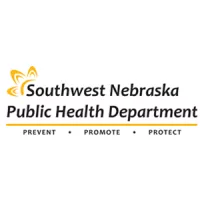
Southwest Nebraska Public Health Department (SWNPHD) has gotten a report of a laboratory confirmed case of pertussis, also known as whooping cough, in the health district. Whooping cough is very contagious and can be serious for babies and people with weakened immune systems; however, high rates of vaccination help create layers of protection around them.
What Is Whooping Cough?
Whooping cough is caused by pertussis germs that get into the lungs. It can make you cough for many weeks. It is often referred to as the 100-day cough.
- It usually takes 5-10 days after being around someone who is sick to start feeling symptoms. Sometimes it can take up to 3 weeks or 21 days.
- Early symptoms: Runny nose, stuffy nose, mild fever, and a small cough. These can feel like a regular cold.
- Later symptoms: After a week or two, the cough can get worse. People may cough over and over until they run out of breath. Some make a “whoop” sound when breathing in. Coughing can also cause vomiting or trouble breathing.
- How it spreads: People can spread whooping cough for up to 3 weeks after coughing starts, unless they get treatment.
What To Do If You Feel Sick:
- Call your doctor right away if you have a cough that won’t go away or if you think you were around someone with whooping cough.
- Antibiotics can help if started early. They can make you feel better faster and stop you from spreading the illness.
- Stay home while you are sick. Cover your mouth when you cough and wash your hands often.
- Keep away from babies, pregnant women, and people with weak immune systems—they can get very sick.
- If you are sick with a cough and have problems breathing, or if children stop breathing for short periods of time, or have seizures, see a doctor immediately.
How to Prevent Whooping Cough:
The best way to prevent whooping cough is to get vaccinated.
- For children: The DTaP vaccine is given at ages 2 months, 4 months, 6 months, 15–18 months, and 4–6 years.
- For older kids and adults: The Tdap vaccine is given at 11–12 years old and then every 10 years.
- For pregnant women: One dose of Tdap during each pregnancy (between 27 and 36 weeks) helps protect newborns.
- Family members and caregivers of new babies should be up to date on their shots at least 2 weeks before being around the baby.
- People who get vaccinated may still get sick, but their symptoms will be less severe and last for a much shorter time.
“We are watching the district closely and working with DHHS to help protect our community,” says Melissa Propp, Clinic Manager at SWNPHD. “The best protection is vaccination, especially for babies. If you have a cough that won’t go away, please see your doctor right away.” Around 60% of southwest Nebraska residents ages 5 to 40 are up to date on their pertussis vaccinations.
For more information contact Melissa Propp, Clinic Manager at 308-345-4223. SWNPHD serves Chase, Dundy, Frontier, Furnas, Hayes, Hitchcock, Keith, Perkins, and Red Willow counties. You can follow us on Facebook, Instagram, You Tube, or view the website at swhealth.ne.gov which contains many resources and information to prevent disease, promote and protect health.














